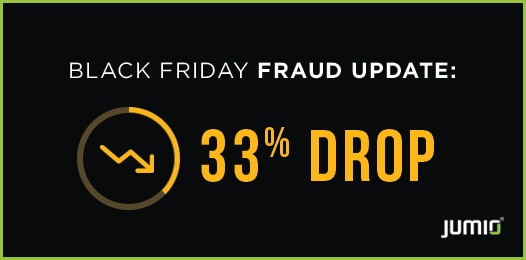
Identity verification leaders find biometric-based measures likely deter online fraud during account setup
PALO ALTO, Calif., Dec. 05, 2017 — Exclusive new data from identity verification provider Jumio today revealed that online fraud, which had been steadily increasing globally between 2014 and 2016, dropped 17 percent in 2017. During the holiday shopping period of Black Friday through Cyber Monday, fraud dropped 33 percent.
Jumio is the global leader in online identity verification, processing nearly 300,000 verifications per day. Where many track fraud related to retail purchases, Jumio conducts ID verifications during account setup across industries including financial services, hospitality, travel, the sharing economy and more. The company compared the fraud patterns from several million transactions between 2014 and 2017 across industries, looking specifically at the period between Black Friday and Cyber Monday, including the day before and after this period. Jumio then compared the rate of fraud for this period to the average for the rest of the year to develop the findings.
| Year | Average Fraud Rate | Black Friday- Cyber Monday Fraud Rate |
% Above Network Average |
|||
| 2014 | 0.828% | 0.801% | -3.3% | |||
| 2015 | 1.055% | 1.264% | +19.8% | |||
| 2016 | 1.181% | 1.373% | +16.2% | |||
| 2017 | 0.993% | 0.921% | -7.3% | |||
But, the overall declines in online fraud should not suggest that all industries are improving to the same degree. Some sectors, such as financial services, are still experiencing higher-than-average fraud levels. In 2016, the financial services sector experienced a 57.4 percent spike in fraud during the Black Friday to Cyber Monday period (compared to the daily average). In 2017, fraud during this period was still higher than the average, but only by 18.4 percent.
| Year | Average Fraud Rate | Black Friday- Cyber Monday Fraud Rate – Financial Services |
% Above Network Average |
|||
| 2014 | 0.828% | 1.011% | +22.2% | |||
| 2015 | 1.055% | 1.678% | +59.1% | |||
| 2016 | 1.181% | 1.859% | +57.4% | |||
| 2017 | 0.993% | 1.176% | +18.4% | |||
“While 2017 witnessed the first decline in fraud in four years, no organization should become complacent. Instead, they should continue investing in ID and identity verification solutions to deter fraud and better establish identity, without scaring off good customers,” said Reinhard Hochrieser, director of product management at Jumio. “Growing tactics like facial scanning and eyeball tracking make it incredibly difficult for fraudsters to mimic someone they’re not. And if a business puts up enough hurdles, fraudsters move on to easier online targets.”
Additional findings:
- Fraud using U.S. IDs during the Black Friday to Cyber Monday period grew 182 percent (almost 2x) from 2014-2016. In 2017, however, fraud using U.S. IDs dropped 29 percent during this period compared to 2016 levels.
- In 2017, fraud in financial services was 36.6 percent higher in the EU than the US.
- In 2017, fraud using European IDs is 8.6 percent higher than with U.S. IDs.
- In 2017, fraud declined 17.7 percent for U.S. sharing economy companies, but declined 41.8 percent in the EU.
According to Jumio, online businesses are increasingly combining ID with identity verification to provide additional layers of identity assurance and fraud detection. Practically speaking, this means deploying multi-layered identity verification measures, which often include biometric facial recognition via a live selfie or video of the customer. These simple, but effective measures, serve as a powerful deterrent to fraudsters, who are often reluctant to have their image on file.
For more information on Jumio’s research, please contact [email protected].
Media Contacts
U.S. Media Contact
Caitlin Haskins
10Fold Communications
415-800-5369
Europe Media Contact
Michael Banner
SkyParlour
+44 (0) 844 2939 764
